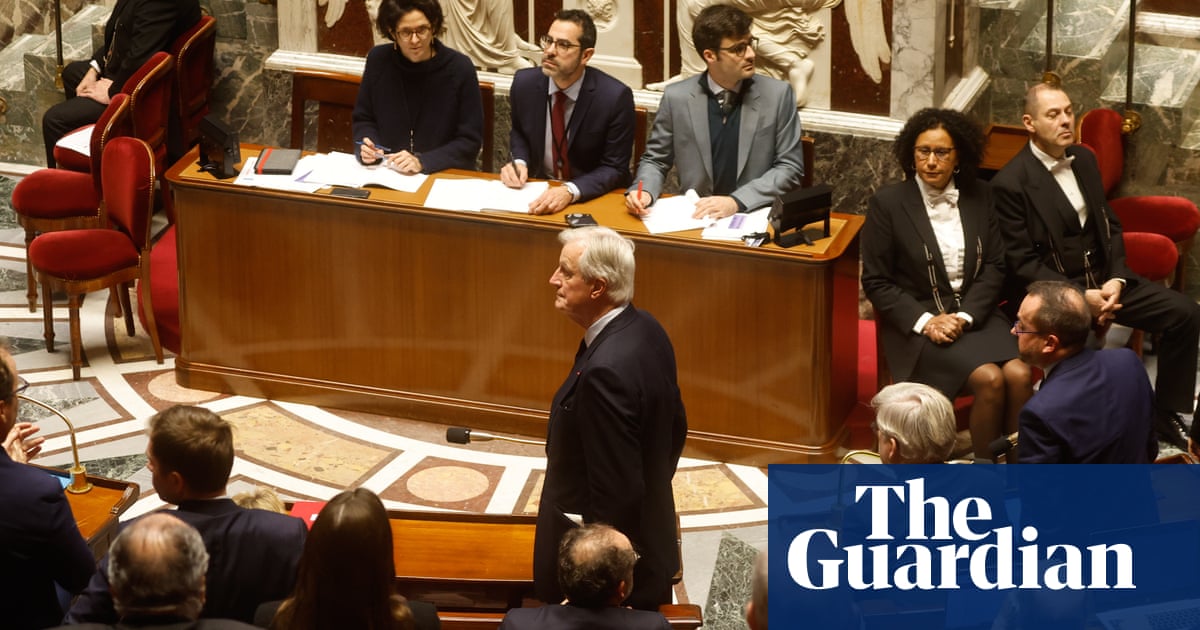What is article 49.3 and why is it being used?
Article 49.3 of France’s constitution allows a government to pass new legislation without parliament’s approval – but in return it gives MPs the chance to challenge that decision by presenting a no-confidence motion within 24 hours. It must be voted on within 48 hours.
If the motion is successful the legislation is rejected and the government is deemed to have collapsed. Both the left-leaning New Popular Front (NFP) and the far-right National Rally party (RN) of Marine Le Pen said on Monday they would back a vote of no confidence.
The Barnier government’s problems stem from President Emmanuel Macron’s decision to dissolve parliament in June and hold early elections after his centrist forces suffered a humiliating defeat in that month’s European parliament ballot.
In the resulting general election, the NFP, a coalition of left-leaning parties ranging from the mainstream Socialist party (PS) to the radical-left Unbowed France (LFI) headed by the political firebrand Jean-Luc Mélenchon, won the largest number of seats.
Macron’s alliance was beaten into second place and the RN, although it finished as the largest single party, placed third. Parliament was therefore divided into three roughly equal blocs – left, centre and right/far right – none of which had a majority.
Why is this happening now?
Macron rejected the NFP’s claim that as the largest parliamentary force it should name the new head of government and appointed Barnier, a veteran conservative, as prime minister after weeks of talks, backed by a fragile alliance of centrist and centre-right MPs.
Since then, the NFP has consistently voted against the government. The far-right RN, however, which under Le Pen has spent years trying to position itself as a responsible party of future government, has so far refrained from trying to take down the government.
By acting tough on some of the RN’s hot-button issues such as crime, security and immigration, and compromising on some of the far-right party’s other red lines, such as measures to ease the cost of living, Barnier had hoped to keep the RN on board for as long as possible.
However, the prime minister’s principal objective was to restore France’s disastrous state finances – including a 2023 budget deficit of 5.5% of GDP that was projected to rise yet further to 6.1% of GDP this year, almost twice the maximum allowed in the eurozone.
The government’s draft 2025 budget features €20bn (£16.5m) in tax increases alongside €40bn in public pending cuts. The two bills that make up the budget must be passed by the end of 2024 and, despite some government concessions, the RN has now rejected parts of the first.
So what could happen next?
Barnier has said there could be “serious financial turbulence” if his budget fails to pass and the government falls, and markets have already responded with alarm, with the interest rate on French bonds coming close to that of their Greek counterparts last week.
There is no fear of a US-style shutdown since France’s constitution allows for a government – even a caretaker government – to pass an emergency law in effect prolonging the previous year’s budget for a few months, so public sector workers, for example, continue to be paid.
In terms of France’s governance, if the RN does join forces with the NFP to bring Barnier down, Macron has a range of choices. But he is constitutionally constrained by the fact that, because he dissolved parliament in June, he cannot do so again until June 2025.
The president could simply reinstate Barnier as prime minister, which parliament would see as provocative and most observers therefore consider unlikely. He could also ask France’s warring political parties to try to build a new coalition, this time with more support.
That could, for example, involve renewed centrist attempts to peel the more moderate elements of the NFP, including the PS, away from the leftist bloc. Although the NFP has frequently appeared fractured, there is no guarantee that would work.
Macron could also decide to appoint a technocratic government to oversee France’s administration for another six months. Finally, he could himself resign, triggering new presidential and parliamentary elections, but for the time being that is seen as unlikely.
Even though Le Pen is saying her party will back a no-confidence vote, the RN could yet change tack and hold fire this time. The final opportunity this year for it to topple the government would be on the last budget vote on 20 December, and many observers still question what political gain there is for Le Pen in bringing Barnier down now.

